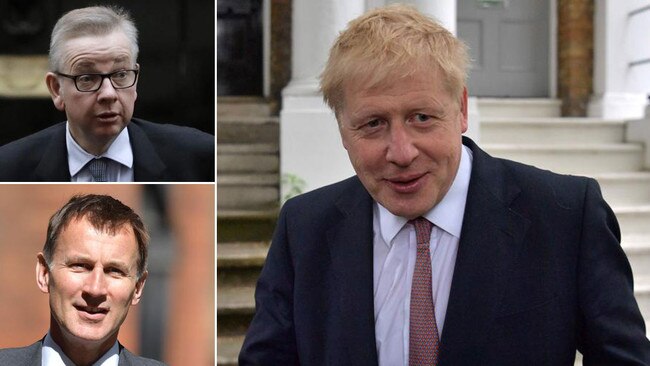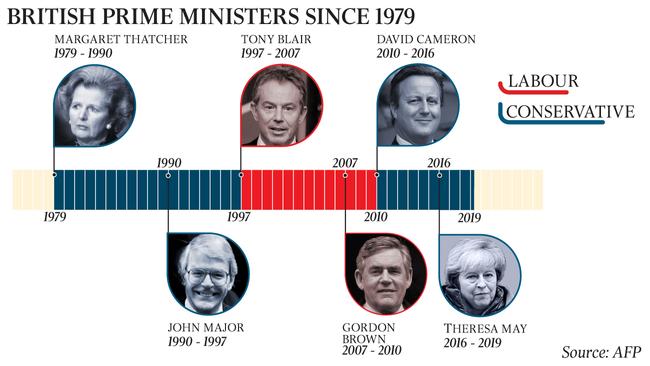Boris Johnson’s Brexit battle plan
The would-be PM known as “the British Trump” vows to tear up Theresa May’s agreement.

The first time Donald Trump tried to call Boris Johnson for a chat recently, the latter assumed it was a hoax. He took a call from someone purporting to be the Downing Street switchboard.
“The person had a mild Irish accent and said, ‘This is the No 10 switchboard, we have got the President of the United States for you. I am just going to patch you through to the White House situation room,’ ” Johnson says.
“Thinking quickly as I do, I said, ‘To all our listeners on Radio Kilkenny, I was not fooled for an instant’.” Johnson hung up and dialled No 10 “and indeed it was the President”.
This is a standard Boris Johnson anecdote. Slightly surreal and chaotic? Check. Interviewee chuckling as he tells his own story? Tick. Story used to illustrate that he is an international power player capable of being the next British prime minister? Present and correct.
But when I sat down with Johnson on Saturday (AEST) for what is his only interview of the leadership election campaign so far, these stories were in rather shorter supply than normal.
To some, he is the British Trump, a populist led by instinct rather than principle, but in a world where Nigel Farage’s Brexit Party is ahead of the Conservatives in the polls and Labour Party leader Jeremy Corbyn looms in the wings, many Tory MPs are concluding that could be just the ticket.
Johnson’s prominence was enough to elicit not one but two recent “very friendly” telephone conversations with Trump. “He not only wished me well but was very keen to intensify our economic co-operation and to do a free trade deal,” he says. “We can do it without in any way compromising animal welfare, food standards, hygiene, or indeed putting the NHS on the table.”
Johnson still has a twinkle in his eye. When he arrives late due to bad traffic, he says: “Sorry to have kept you. The new mayor of London needs to get his act together.” But he is more careful. When I spied a rugby ball in his office and asked: “Is that the ball that came loose at the back of the scrum?” — a reference to a previous circumlocution about his leadership ambitions — Johnson seized the ball and put it behind his back to avoid being photographed with it.
Brexit by October
Theresa May’s resignation as Tory leader on Friday has at least liberated him to be clear about his ambitions. Why does he want to be prime minister? “I have a strong sense that I really am the candidate best equipped not only to deliver Brexit but also to suppress the challenge from a new insurgent party, and also the Liberal Democrats, both of whom are feasting on the current crisis.
“Above all that I am the best placed to defeat Jeremy Corbyn, who is yet another emanation of a small clique of the London Labour eft that I have long experience of beating in the past.”
This has about it a whiff of the sense of destiny that sustained Johnson’s political hero Winston Churchill. If he wins, Johnson would be confronting the greatest political crisis since 1940.
Johnson freely admits he feels “a real sense of personal responsibility” for delivering Brexit after his pivotal role in the 2016 referendum campaign. “I have a deep sense of frustration at the way the most important project in our lifetimes has been going.”
He says that last week’s by-election, when the Brexit Party nearly seized a seat from Labour, is proof that there can be no further extension to the talks beyond the northern autumn.
“The lesson from Peterborough is that we must get Brexit done by October 31 or we face the real risk of a Jeremy Corbyn government,” he says.
Johnson’s plan is to tear up May’s withdrawal agreement, “shed the old intellectual prison of the backstop arrangements”, send ministers rather than officials to play hardball with Brussels, and prepare for no deal in the hope that that shifts the dial in Brussels.
“We will have in the UK a new administration with a new mandate,” he says. “We will have a different attitude in the negotiating team and a different negotiating team.” This is code for banishing Oliver Robbins, the chief civil service negotiator. “I will be giving personal direction to the negotiations but we will also have a very strong and ministerially led negotiating team.”
He wants issues surrounding the Irish border consigned “to the discussion on the future partnership, which is where it logically belongs and where it should have been all along”.
A carrot and two sticks
To sweeten the pill he plans to unilaterally and “unconditionally” recognise the rights of the 3.2 million EU nationals in Britain. “That is something that I think would be very welcome on the other side of the Channel.”
He has two pieces of leverage. The first is to prepare properly for no deal. “My duty will be to get our country ready for the very, very small possibility of coming out without a deal, on WTO (World Trade Organisation) terms. It is only by being ready to deliver it that you will get the deal that we need.”
Johnson insists that planning for no deal is already “far advanced” and that “there are extensive plans already in place to mitigate the impacts for farmers” and “for those who need just in time deliveries”, such as car manufacturers.
But he adds: “People must be ready for the possibility of some disruption.”
Johnson is clear on where he gets his leverage from — the money. He pledges not to hand over the £39 billion ($71bn) agreed by May until he gets what he wants.
“I think our friends and partners need to understand that the money is going to be retained until such time as we have greater clarity about the way forward. I always thought it was extraordinary that we should agree to write that entire cheque before having a final deal.”

Facing down parliament
MPs intent on blocking Johnson from pursuing a no-deal Brexit are already discussing how to thwart him with a no-confidence motion or a device approved by the House of Commons Speaker to sanction a binding vote to revoke article 50. If they are successful, a premiership he has wanted for 10 years could be over in 10 days.
Johnson insists the advent of the Brexit Party will convince both Tory and Labour MPs “that they face an existential threat … because we haven’t delivered Brexit”.
He adds: “If we fail we will pay a very, very heavy price. My message to all colleagues who are thinking of elaborate manoeuvres to frustrate this is that they really need to think about their democratic duty.”
But why would Brussels, where he is not liked, do more for Johnson than for May? “They will want us out … Politics has changed.”
TV debates
Some MPs think this is optimism on stilts. Others question Johnson’s abilities under fire and want to see him tested in TV debates, as May was not before she got the job. Will he turn up?
“I have done a great many TV debates in my time. That is being discussed by my team with the broadcasters.”
This is not a firm commitment. “It depends what the offer is,” he says.
One-nation Tory
Johnson’s offer to moderate Tories distrustful of his approach on Brexit is that he will govern for the whole party and the whole country, just as he did as mayor of London between 2008 and 2016.
“I am a one-nation Conservative. If people want to see my political identity let them look at what we did in London. I ran a big team and a team of stars that got a huge amount done. I governed the greatest city on earth from the centre ground of politics.
“When I became mayor of London we had four of the six poorest boroughs in the UK. When I left eight years later we had none of the poorest 20.
“We massively expanded the living wage. We raised the standards of living for the poorest and neediest in society.”
Foreign secretary
Johnson is less vocal about his time at the Foreign Office. He bristles.
“My tenure as foreign secretary was marked by perhaps the biggest diplomatic coup this country has ever pulled off. We encouraged about 30 countries around the world to expel a total of 153 diplomats, Russian spies, in sympathy with the UK in response to the Skripal poisoning in Salisbury.”
A job for Gove
Johnson’s new team of stars could include Michael Gove, who ended Johnson’s leadership hopes three years ago.
“I have known Michael since he was 18. He is a man of great talent and my job is to bring the party together,” he says.
Has he forgiven him? “Yes, I am not a vindictive person at all. I bear no grudges.”
Does Johnson regret abandoning his campaign in 2016?
“I do in a way,” he says, “but the interval has sharpened my appetite for the job (and) deepened my understanding of what needs to be done”.

Home alone?
If he moves into Downing Street, Johnson, who separated from his wife last year, could be the first prime minister without a spouse since Ted Heath in the early 1970s. MPs wonder if he will move in his partner Carrie Symonds, who is 24 years his junior.
Johnson isn’t saying: “I think what the people want to hear is my policies, my agenda, how we are going to get through the last stage of the Brexit negotiations.”
Naughtiest thing
All that remains is to ask him the standard question about the naughtiest thing he has ever done. While some candidates have gone to extreme lengths to look hipper than May running through fields of wheat, Johnson — who could probably spend an hour on the subject — demurs: “I want to reassure all colleagues who may be wondering about this that anything falling into that category has already been heavily publicised.”
In times past Johnson confessed to attempting unsuccessfully to snort a line of cocaine only to retract later, claiming it may have been icing sugar. Rival Rory Stewart boasted about smoking opium. Has Johnson? “No, not to my knowledge,” he replies. At this point his spin doctor shouts out: “The answer is no!”
Vegan experiment
His team, Symonds included, has got Johnson into position to win, and into shape. He has lost a lot of weight.
“I did briefly experiment with veganism. It didn’t last. I find it difficult to keep it up for more than six hours at a stretch.” What broke him? “I think it was the sheer cruelty of being deprived of cheese. I think I did a couple of days.”
The big question facing Tory MPs is whether he can keep up the political self-control for longer. If he manages six weeks rather than six hours, the job should be his.
The Sunday Times

To join the conversation, please log in. Don't have an account? Register
Join the conversation, you are commenting as Logout